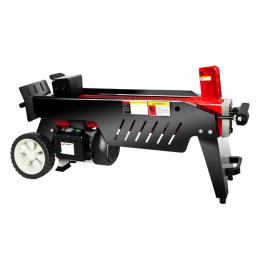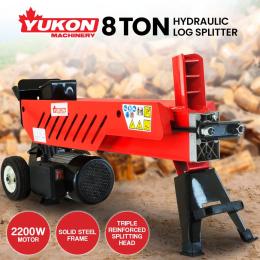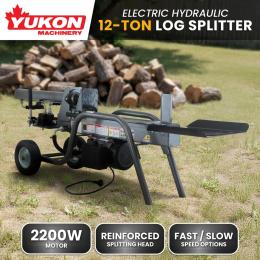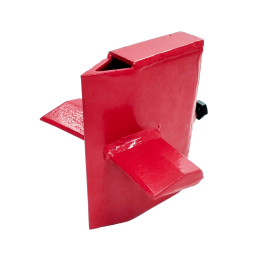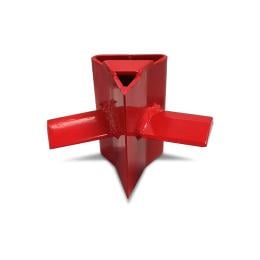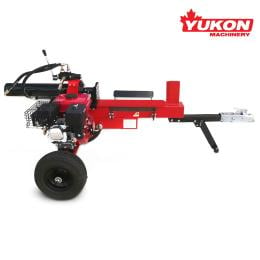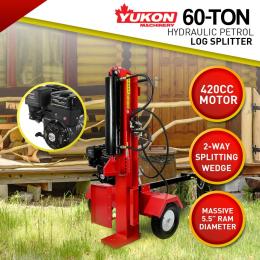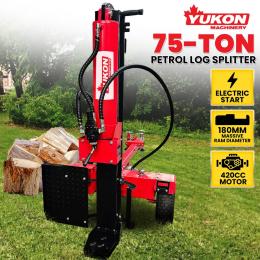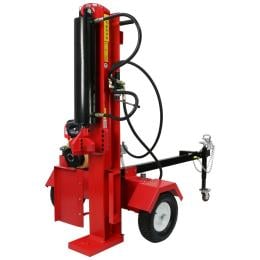
Log Splitters
At Klika, we stock a wide range of powerful and reliable log splitters designed to make firewood preparation fast, safe, and effortless. Whether you're splitting logs for home heating, commercial applications, or rural use, we’ve got the right tool for the job. Choose from our collection of electric, petrol, and diesel-powered log splitters, engineered for performance and durability. With options ranging from compact 7-tonne electric splitters ideal for domestic use, to heavy-duty 75-tonne petrol splitters for large-scale timber processing, Klika has a solution for every need.
-
Electric Log Splitters
-
Yukon 7 Tonne 2000W Electric Hydraulic Log Splitter Wood Cutter w/ Side Protectors
$499
-
Yukon 8 Tonne 2200W Electric Hydraulic Log Splitter Wood Cutter
$599
-
Yukon 12 Tonne 2100W Electric Hydraulic Log Splitter Wood Cutter
$1095
-
Yukon 12 Tonne Electric Hydraulic Log Splitter Heavy-Duty Firewood Splitter
$799sale$1050
-
4-Way Cross Cut Log Splitter Wedge 12T-15T
$49

-
4-Way Cross Cut Log Splitter Wedge 7T-8T
$54

-
Petrol Log Splitters
-
Yukon 15 Tonne Hydraulic Petrol Engine 196cc Log Splitter XB
$995
-
Yukon 18 Tonne Hydraulic 6.5HP Petrol Engine Log Splitter
$1059
-
Yukon 20 Tonne Hydraulic Petrol Engine 196cc Log Splitter
$1199
-
Yukon 60 Tonne Petrol Hydraulic Log Splitter 420cc Vertical and Horizontal
$2149
-
Yukon 75 Tonne Hydraulic Petrol 420cc Log Splitter Electric Key Start Vertical and Horizontal
$2799
-
Diesel Log Splitters
-
Yukon 60 Tonne Log Splitter Key Start Diesel Hydraulic 498cc Vertical and Horizontal
$2549
Electric Log Splitter, Petrol Log Splitter, Diesel Log Splitter, Electric Hydraulic Log Splitter, Hydraulic Log Splitters for sale
All of our log splitters have hydraulic rams which do the hard work. This means that they are all classified as Hydraulic Log Splitters.
The main difference between each type is what provides power to the hydraulic pump. For log splitters the pump is driven by either an electric motor or a fuel combustion engine such as petrol or diesel (where higher power is required). We have a high-quality range of log splitters available.
Log Splitter Buyer's Guide:
Choosing the right log splitter is essential for efficient wood processing. Here's a concise guide to help you make an informed decision:
1. Types of Log Splitters:
-
Electric Log Splitters: Ideal for residential use, these are quiet, require minimal maintenance, and are perfect for light to medium-duty tasks.
-
Petrol Log Splitters: Suitable for heavy-duty tasks and remote locations without electrical access, offering higher power and mobility.
-
Diesel Log Splitters: Known for durability and fuel efficiency, excellent for industrial applications and continuous use.
2. Key Features to Consider:
-
Tonnage: Determines the splitting force; higher tonnage is needed for hardwoods and larger logs.
-
Cycle Time: Faster cycle times increase productivity by reducing the time taken to split each log.
-
Orientation: Horizontal splitters are common for smaller logs, while vertical or dual-position splitters handle larger, heavier logs with ease.
3. Safety Tips:
-
Always read the user manual before operation.
-
Wear appropriate safety gear, including gloves and eye protection.
-
Ensure the splitter is on stable, level ground during use.
At Klika, we offer a diverse range of log splitters to suit various needs. Explore our selection to find the perfect tool for your wood-splitting tasks.
For a more detailed guide, visit our Log Splitter Buying Guide.
Electric Hydraulic:
These are the ideal solution for home and small rural properties. Electric-hydraulic offers great performance and enough power for most firewood and kindling with splitting forces from 7 ton up to 12 ton at the ram.
Pros:The Electric-hydraulic solution would be perfect for locations where 240v power is available. Electric is also suitable for indoor use as they produce no fumes or exhaust and run relatively quietly. They are also suitable for outdoor use in dry weather.
Cons: Electric splitters should not be used outdoors during any poor weather conditions. Often not suitable for massive logs or hard wood.
Petrol Hydraulic:
These more powerful splitters offer a higher level of splitting force, from 15 ton up to 60 ton, so they are ideal for larger splitting jobs including light commercial work and rural property work. Petrol splitters offer greater versatility over electric.
Pros: Can be used anywhere outdoors without the need for electric power, and in poorer weather conditions where it would be unsafe to use electricity.
Cons: Because petrol splitters emit exhaust they should not be used indoors or in confined spaces. Because they run a combustion engine they are a little noisier than electric.
Diesel Hydraulic:
Like the 60 ton petrol, the diesel log splitters are ideal for heavy workloads and long working hours. The huge force available will cut through the toughest of logs and can be operated either horizontally or vertically, saving you the back-breaking work of lifting logs off the ground.
The pros and cons are the same as for petrol but diesel is better suited for properties where diesel may be a more readily available fuel source on hand.
| Power Type: | 240 volt electric |
| Fuel Type A: | Unleaded Petrol |
| Fuel Type B: | Diesel |
| Ram type: | Hydraulic |
| Max ram diameter: | 140mm |
| Splitting force: | 7-60 tonne |
| Max displacement: | 498cc (diesel) |
| Price range: | $429 - $2199 |
| Delivery: | Courier |
| Pickup: | Click and Collect |
Usage Videos: How To use a Wood Splitter
Need more information on splitting a log?Call or email us to answer any questions you may have, or visit our showroom to see first hand before you make a purchase!
Frequenty Asked Questions
How much oil and type of oil required for a 8 ton log splitter?
The hydraulic oil and the capacity is 4.2L.
Where is the dipstick?
The dipstick is located under the bleed screw
Where is the bleed screw?
It's the small wing nut at the splitting end open two or three rotations when splitting


